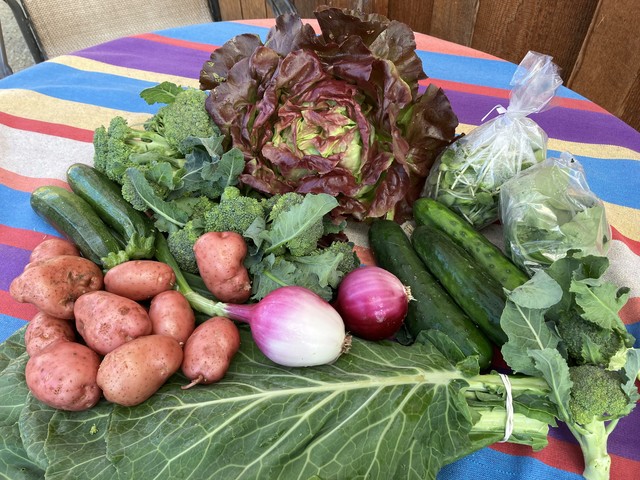- Broccoli
- Cucumbers
- Collard Greens
- Basil
- Head Lettuce
- New Potatoes
- Zucchini
- Sunflower Shoots
- Purplette Onions
Basil is Still Cranking!
If you haven't stocked your freezer with pesto for wintertime, there's still time! CSA members are invited to place a special order for delivery to your pickup site. To Order:
Email your name, phone number, CSA site and desired quantity to: betsharrison@gmail.com
Available in 1 pound bags, no limit. $22/lb
Land Use, Affordable Housing and the Farm
One of the things that makes Oregon so special is our land-use planning system, which celebrates its 50th birthday next year. It's arguably the most forward-thinking land use system in the country, with strict laws designed to protect farm and forest lands, to prevent sprawl by establishing urban growth boundaries, and to create a process for smart, controlled growth. It was born into law in 1973 through Senate Bill 100, out of concern that Oregon was quickly heading in the direction of our neighbor to the south, California, which was undergoing rapid transformation as urban and suburban sprawl wiped out farmland and changed the landscape forever. Senate Bill 100 is why to this day Oregon still looks different.
I took it for granted during my childhood, but when I fledged and began living in other places - Massachusetts, Minneapolis, the San Francisco Bay Area, the Salinas Valley - and traveling to lots of U.S. states (Illinois, Florida, Colorado, Arizona, Tennessee, Montana, Alaska, North Carolina, Virginia, Utah, and more!), I began to notice how heartbreakingly different those landscapes were compared to Oregon. Cities and towns spilled outward onto farmland in the form of messy, ugly sprawl. Tracts of beautiful ranchland were chopped up into 5 acre hobby farms (Montana's stunning Flathead Valley being one of the more painful landscapes for me to spend time in). Outside of Chicago, some of the world's richest soil was buried under miles of subdivisions, never to be farmed again. Each time I came home to Oregon it became more and more clear to me how unique our state was, how beautiful it was, and how grateful I was for good land use planning. Sidenote: If you want to learn more about the history and evolution of Oregon's pioneering land use approach, OPB is doing a series leading up to the 50th annivesary of Senate Bill 100. The first two installments are available to listen to, or read:
Protecting working landscapes is not just about aesthetics, though. Keeping farmland intact and contiguous helps keep farming viable. If you break it up, the long term effect is the slow erosion of entire farming communities: as farms disappear, so do the businesses that farmers rely on like mechanics, feed stores, tractor supply stores, and more. Our zoning helps keep our greater farming ecosystem alive and well.
But as Oregon continues to grow, our land use laws face increasing pressure. The more people that move here - and LOTS of people are moving here (retirees, climate refugees, work-from-home Wi-Fiers) - the more housing we need. I've never seen so much new construction here in all of my four+ decades. But even with all those nail guns rat-a-tat-tatting, framing up new walls, putting on new roofs, there's a big shortage of affordable housing in Curry County. Rents and home prices continue to climb, outstripping what working class families can afford. It's become the biggest challenge for the farm: how to recruit new hires when they won't be able to afford to live here. Such a problem, in fact, that we are losing an employee because of it, and were turned down by numerous qualified candidates last winter when we were recruiting. It's a problem that plagues a lot of the other backbone businesses in the area as well - restaurants, grocery stores, service jobs of all kinds.
In July the Curry County Planning Commission voted unanimously to make some significant changes to county zoning, ostensibly to address the lack of affordable housing in our area. The changes would allow for ADUs and higher density use in certain areas. Although I generally tend to think that thoughtful urban infill is a good development approach (far better than breaking up farmland and working landscapes with 5 acre ranchettes), there hasn't been much community input in this process and there are problems with the changes. One of the biggest issues is that these new zoning laws would allow any new additional housing to be used for short term/vacation rentals. That most definitely does NOT solve our housing crisis in Curry County. For this community to thrive in a meaningful way - supported solidly by the people who change your oil, bag your groceries, make your sandwich, pump your gas, and - I daresay - grow your food, we need affordable housing for the folks who are trying to live and work here, not just more AirBnb's.
The Curry County Commissioners will vote on these new zoning changes at their August 17th meeting. If you want to learn more, you can review the proposed changes by reviewing the docket from the July 21st Planning Commission meeting here: https://www.co.curry.or.us/government/planning_commision/index.php#revize_document_center_rz2436
You can read comments submitted by concerned citizens here:
https://cms6.revize.com/revize/currycountyor/document_center/planning%20commision/2022%20Meetings/July%2021,%202022/ZOA-2022.1%20Comments%20-%20July%2021-2022%20PC%20Meeting.pdf
And you can also check out the 100 Friends of Port Orford blog for more background info:
https://100friendsofportorford.org/
And you can always write a good old-fashioned letter to our county commissioners to voice your concerns!
Zoning is the most fundamental thing that affects the character and livability of this place we love so much. Over the past 50 years, Oregon's land use system has only survived because people have continued to fight for it. After all - no good thing ever came easy.

